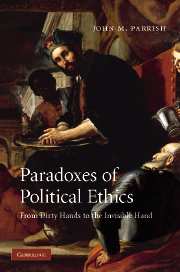Introduction
Published online by Cambridge University Press: 22 September 2009
Summary
Do you think you can govern innocently?
Jean-Paul Sartre, Dirty HandsPolitics, people say, is a dirty business. “All kings is mostly rapscallions,” Huckleberry Finn observed, and Huck's characterization still seems to apply to most of those bureaucrats, glad-handers, and occasional statesmen who rise as best they can to what was once the business of kings. Our sense that politics is “dirty” appears well grounded. Popular cynicism about politics is at a peak, especially in the United States, and not without reason. In recent decades we have witnessed some truly astonishing acts of brutality, intemperance, dishonesty, and selfishness among our national leaders and public officials. Compared with the relative infrequency with which we glimpse true political decency (much less heroism) in public life, it is hard to avoid perceiving politics as a place where one is lucky indeed not to pick up some of the taint and odor that go with the territory of unsavory work.
Our perception of politics as a dirty business, however, is not merely a product of recent events. It also reflects something deeper and more permanent in our understanding of the relationship between ethics and politics. Across the centuries we find an enduring and surprisingly resilient belief that, of all the scenes of human life, perhaps the hardest in which to play one's role with true moral dignity is the sphere of public action. Of course moral action is difficult in general; that fact is as old as the idea of morality itself.
- Type
- Chapter
- Information
- Paradoxes of Political EthicsFrom Dirty Hands to the Invisible Hand, pp. 1 - 26Publisher: Cambridge University PressPrint publication year: 2007



